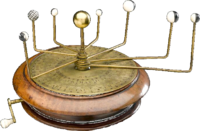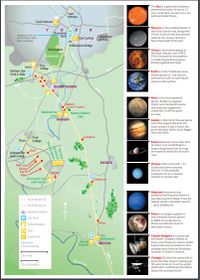Orrery: Difference between revisions
From DT Online
mNo edit summary |
mNo edit summary |
||
| (One intermediate revision by the same user not shown) | |||
| Line 26: | Line 26: | ||
The '''DT Online''' article '''[[Orrery Model]]''' shows how to make one using [[:Category:Stripwood Technology|Stripwood Technology]]'''. | The '''DT Online''' article '''[[Orrery Model]]''' shows how to make one using [[:Category:Stripwood Technology|Stripwood Technology]]'''. | ||
[[File:OrreryGroup.png|center|800px|DT Online Orrery |link= | [[File:OrreryGroup.png|center|800px|DT Online Orrery |link=Orrery_Model]] | ||
Latest revision as of 11:43, 18 November 2020
Description

Models of the Solar System have been made since the times of Ancient Greece and Rome and by the early 18th century clockmakers used Gears to make models which could show the Orbits of Planets around the Sun. One such clockwork model was presented to Charles Boyle, 4th Earl of Orrery and this how they became known as Orreries.
Features and Applications

Orreries can show the positions of the Planets and their movements around the Sun but it is difficult to represent the Solar System to scale because of the great size of the Sun and Planets and the massive distances between them (measured in Astronomical Units or AUs) – especially if both the Inner Planets and Outer Planets are to be included.
Smaller, table-top size models overcome this by using different Scales for the diameters of the Planets and the distances they are from the Sun to create a model which a least indicates their size relative to each other. But even in this case the Sun is not scaled because it is so big - try the Exploratorium Calculator!
Larger Planetarium models attempt to provide a more realistic sense of scale and distance by projecting on to a dome or ceiling – usually this is limited to the Inner Planets. Scale models of the full Solar System can be set out in parks, on cycle routes or along public footpaths. One such model can be found in York where it is spread out along 10.2 km (6.4 miles) of the old East Coast main railway line. Details of the York Solar System model includes a map of where the Planets are located on the cycle route and how they where made, together with information relating to a smaller walking route within the York University Campus.
Activity: The order of the Planets starting from the Sun is: Mercury, Venus, Earth, Mars, Jupiter, Saturn, Uranus, Neptune (and once included Pluto which is now reclassified as a Dwarf Planet). The sequence can be remembered using a Mnemonic one example of which is a phrase in which the starting letter of each word is used to name the Planet such as: Many Vicars Eat Mushy Jam Sandwiches Under Netball Posts. Others exist but can you think of a new one of your own which does not include Pluto?
Making Model Orreries
The DT Online article Orrery Model shows how to make one using Stripwood Technology.

Working models of different complexities can be made from a range of different materials or construction kits such as Lego and Meccano as shown below. See also the NASA website Table-top Models for more ideas.
| A good simple design for a working Orrery by Paul Newham at the Ivydale Science & Technology Service | Building Instructions and further details of this Lego Orrery model are available on the JK Brickworks website. | This is a Meccano three planet orrery made by Meccano Kinematics. All components are available from MeccanoMan - (Note: the video shows the orbits in reverse!).
A much simpler design is featured in the Meccano Manual of June 1918 as Model No. 391. |
The planetarium 3d model was created by Joe S with Blender 2.81. The gear 3d models were created with OpenSCAD 2019.05 and the Gears Library for OpenSCAD. The gear ratios were calculated with the Compound Gear Train Calculator and the orbit periods were taken from NASA. |
 |
 |
 |
 |
 |
| Solar System Model |
Orrery Kit |
Solar System Mobile |
Planetarium Model |
Lego type Orrery |